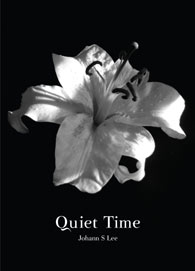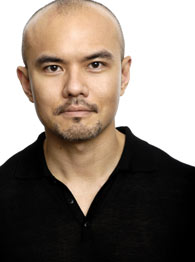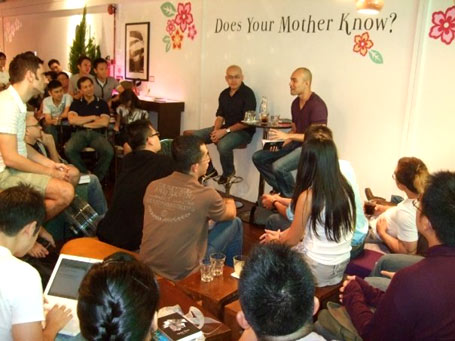I'm at DYMK, the Chinatown gay bar and cafť where Johann S. Lee's holding a launch party for his new novel. He's treating us really nice - stuffing us full of his niece's cakes and specially thanking his hardcore fans in the room (everyone who listed him as their favourite author on Facebook got special invites).

Top of page: Launch of Quiet Time at DYMK bar and cafť with Johann S. Lee and Nominated Member of Parliament Siew Kum Hong (left) on Dec 27, 2008.
I was doubtful. You see, Johann became famous in 1992 when he wrote Singapore's gay novel Peculiar Chris at the age of 21. In 2007, he published his long-awaited second book, To Know Where I'm Coming From. Both books were important as pioneering documents of gay Singapore culture, but both were also extremely flawed, with pretty bland literary styles and unconvincing characters. (You can read my mixed review of Johann's last book here:
But on the train back home, I started reading. And I thought, oh my god. Quiet Time really is very good.
In fact, among the few gay novels published in Singapore - minor things like Andrew Koh's The Glass Cathedral, Ovidia Yu's The Mouse Marathon, Edmund Wee's The Narcissist and David Leo's Different Strokes - Quiet Time rises resolutely to the top. This is, unarguably, Singapore's best gay novel so far.
Before I do a full review, though, I'll give you a little recap of the launch. First, Johann did some readings from his first two books (he's got a really good sonorous speaking voice, in case you want to invite him to literary festivals). Then he brought out his guest-of-honour, Nominated Member of Parliament Siew Kum Hong, the straight but sympathetic lawyer who submitted the petition for the repeal of Singapore's sodomy law in 2007.
Johann explained how he'd been inspired to write Quiet Time after witnessing the events in gay activism in 2007, centering on the debate around the sodomy law (otherwise known as Section 377A). There's even a character modeled after Kum Hong in the book, and the speech he delivers is pretty much lifted from the parliament transcripts.
"I am quite sure - and I told Kum Hong this - that the closing part of your speech will be studied by civil rights students," Johann said during their dialogue.
Kum Hong rather humbly acknowledged how the speech isn't written in his usual, factual style - gay activist/lawyer George Huang, who first approached him to submit the petition, urged him to try a more rhetorical, inspirational voice. He also noted his admiration for the Members of Parliament who backed him up, namely Hari Kumar, Baey Yam Keng and Charles Chong (who actually spoke up to contradict Prime Minister Lee Hsien Loong directly after he'd spoken). Still, he noted that out of 94 MPs, only four spoke up strongly, when he knows that many more would have been sympathetic to the cause.
"Was there any speculation about your sexuality?" Johann asked.
"Of course! Not to my face! That was one of the things I didn't think through [when I accepted it]. But I would have gone through with it."
"We're lucky he's rash," Johann joked.
Kum Hong described how the comments section of the Straits Times online report was full of claims that he was gay - he even got asked the question by a New Paper reporter.
His civil servant fiancťe, Marianne Ha, also caught some of the flak. "Even my colleagues would say some things," she told the audience. "I don't regret at all what he did, [but] I think I was disheartened by the way some people reacted."
"I think as a country we're richer for people like Kum Hong and Marianne in our midst," Johann added.
During the Q&A session, Kum Hong also answered questions about his relationship with NMP Thio Li-Ann, who spearheaded the drive to keep 377A based on "moral" grounds, using some pretty hateful anti-gay language. Interestingly, Kum Hong says that homophobia aside, her politics isn't very different from his - they both agree on many other issues of human rights advocacy.
Then came the reading from Quiet Time. Johann explained how he'd been galled to start writing again after Ivan Heng and Alfian Sa'at staged Peculiar Chris as a play - returning home, he felt ashamed that he hadn't written anything in years. That was why he wrote To Know Where I'm Coming From - but he wasn't satisfied with the reviews that called him "bland" (Fridae) and "earnest and artless" (The Sunday Times).

Author Johann S. Lee
In Quiet Time, his characters are more developed, likable and three-dimensional than they've never been before. The whole book's also much more mature in its outlook - as Johann says, Peculiar Chris was about coming out, To Know Where I'm Coming From is about growing up, but Quiet Time is about settling down.
Our hero's the 37-year-old Kuang Ming, a disillusioned, low-income freelance writer who's constantly being told that he's losing the muscle tone of his earlier years - a nice change from the leading men of the first two books, who were both hunky poor little rich boys. (Fun fact: Kuang Ming first appeared as a minor character at the very end of Peculiar Chris.)
Kuang Ming's in a ten-year-old relationship with Josh, the party-going, gym-obsessed CEO of a local gay website, Adonis.com (obviously modeled after Fridae.com's Stuart Koe, but not in a flattering way). Their open relationship is on the rocks, and there's a hot London doctor called Ethan Yap who's interested in him - who's he gonna choose?
His family life's also gone haywire: his widowed mother's getting old, his big sister Min Li's a pregnant Bible-thumping anti-gay rights campaigner, and his ridiculously hot sexy younger brother Shaun has just come out of the closet. Predictably, the result is drama, drama and more drama.
Yet there's a new degree of humour and tenderness in the work. Now, when he casts his eye on the absurdity of gay culture - protein shakes, exquisite dťcor, identical international Gay Pride parades - it's not just critical, it's actually funny. (There's an exceptionally bizarre moment when Kuang Ming discovers his kid brother and his boyfriend have met in a bathhouse).
The theme of family is also very strong: though Kuang Ming and Min Li are on opposite sides of the gay rights debate, they're able to sit down at the same dinner table and talk about their lives. It's also a strange comfort, in between tales of gay drama, to have tiny bits of family-centered Hainanese tradition thrown in, like calling uncles "ku deh" and making chicken rice balls with your hands for Chinese New Year reunion dinners.
But what's most important, in my opinion, is the way the book opens up the topic of gay parenting. The prologue of the book describes Kuang Ming visiting his son at school in the year 2018, and throughout the rest of the book there are examples of gay men and lesbians who're in some way caring for children as uncles, godparents, and biological or adoptive parents.
Too few gay Singaporeans seem to be able to conceive of the possibility of raising kids - one gay Christian friend of mine even felt like it might be morally wrong to do such a thing. But thousands of gay and lesbian people have done this for decades in Europe and North America (I went to college with a few kids from gay families, and they were as cool and normal as anyone else). If we want a gay culture where we're seen as relevant beyond the age of 40, some of us have got to at least envision becoming fathers and mothers - and daring to brave any authorities who try and stop us.
The book isn't perfect - the prologue is still a little flavourless, and every now and then the author invests more time on explaining the background of Tiong Bahru or London than is really necessary or graceful. Ironically, while one of his professed aims is to inspire young readers of the future with the activism of 2007, his sketch of the campaign against 377A is a little distant and mechanical, much less intriguing than his descriptions of family, festivals and fucking.
But the novel's solid, thoughtful, delightful to read and very culturally significant. Though Johann continues to protest that he's not a "real" writer, only an amateur, with this novel he's come into own - and should be counted with the best novelists of Singapore, gay and straight.
Johann doesn't have Singapore citizenship anymore - traded it for a British passport years ago - and several people who've read the book have lamented that this makes him ineligible for our literary prizes. Still, he says he's settling back here in two years' time, which gives me hope.
Sure, he says he's finished his triptych of gay novels, but let's face it, he's only in his (late) thirties. Quiet Time argues that gay men can mature gracefully as they grow older - and its quality of writing proves that statement.
I believe we'll definitely be seeing more of this man. Johann S. Lee, the writer, has finally arrived: he's broken through.
Quiet Time by Johann S. Lee is currently available in Singapore at TIMES the Bookshop and at SportsmenAsia, Chinatown Point at SGD24.61. It will soon be available at MPH and Kinokuniya. To order any of his books from overseas, go to SportsmenAsi.

